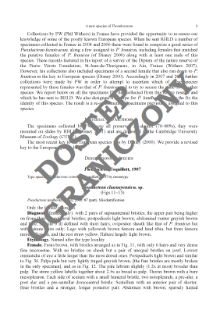- Search in all Repository
- Literature and maps
- Archeology
- Mills database
- Natural sciences
Advanced search
Advanced search
Advanced search
Advanced search
Advanced search

Object
Title: Western Antarctic fish species and biomass diversity
Creator:
Kulesz, Joanna ; Rakusa-Suszczewski, Stanisław ; Polska Akademia Nauk. Muzeum i Instytut Zoologii
Date issued/created:
Resource type:
Subtitle:
Fragmenta Faunistica, vol. 48, no. 2 ; Ryby Zachodniej Antarktyki i zróżnicowanie ich biomasy
Publisher:
Museum and Institute of Zoology, PAS
Place of publishing:
Description:
Bibliogr. p. 228-229 ; P. 217-229 : ill. ; 25 cm ; Abstarct in Polish. Taxa in Latin.
Type of object:
Abstract:
Of the 168 fish species living in the Western Antarctic, 104 species belonging to 20 families occur in the South Shetland area: 39 species from 10 families have been found in the Admiralty Bay, 91 species (29 families) in theSouth Georgia area; the South Orkney region hosts 74 species from 18 families while the near Antarctic Peninsula shelf 71 species from 19 families. The respective figures were lower in the Southern Sandwich area, amounting to 44 species from 17 families. Endemic species amounted to 61.2%, the remaing 38.8% being cosmopolitan. The South Georgia area and the neighbouring Shag Rocks area differed also in the composition and biomass of several commercially harvested fish species, such as Pseudochaenichthys georgianus Norman, 1937, Notothenia rossii Richardson, 1844, Patagonotothen guntheri Norman, 1937 or Lepidonotothen squamifrons Günther, 1880. The South Shetland and Antarctic Peninsula regions were also distinguished from the South Georgia region by the presence of Champsocephalus gunnari Lönnberg, 1905 and above all, by the biomass of Gobionotothen gibberifrons Lönnberg, 1905, which is present in the former, but not found in the latter of the areas.
Relation:
Volume:
Issue:
Start page:
End page:
Detailed Resource Type:
Format:
Resource Identifier:
oai:rcin.org.pl:54194 ; 10.3161/00159301FF2005.48.2.217
Source:
MiIZ PAN, call no. P.256, T. 48 nr 2 ; MiIZ PAN, call no. P.4664, T. 48 nr 2 ; click here to follow the link
Language:
Rights:
Rights Reserved - Restricted Access
Terms of use:
Digitizing institution:
Museum and Institute of Zoology of the Polish Academy of Sciences
Original in:
Library of the Museum and Institute of Zoology of the Polish Academy of Sciences
Projects co-financed by:
Programme Innovative Economy, 2010-2014, Priority Axis 2. R&D infrastructure ; European Union. European Regional Development Fund
Access:
Object collections:
- Digital Repository of Scientific Institutes > Partners' collections > Museum and Institute of Zoology PAS > Scientific Journals
- Digital Repository of Scientific Institutes > Partners' collections > Museum and Institute of Zoology PAS > MIZ PAN Publications > Fragmenta Faunistica
- Digital Repository of Scientific Institutes > Literature > Journals/Articles
Last modified:
Aug 2, 2024
In our library since:
Jun 8, 2015
Number of object content downloads / hits:
66
All available object's versions:
https://rcin.org.pl./publication/61190
Show description in RDF format:
Show description in RDFa format:
Show description in OAI-PMH format:
| Edition name | Date |
|---|---|
| Western Antarctic fish species and biomass diversity / Kulesz, Joanna ; Rakusa-Suszczewski, Stanisław | Aug 2, 2024 |
Objects Similar
Danilkiewicz, Zbigniew Polska Akademia Nauk. Muzeum i Instytut Zoologii
Hillbricht-Ilkowska, Anna Prejs, Andrzej Węgleńska, Teresa
Prejs, Andrzej
Pieczyńska, Ewa
Stańczykowska, Anna
Jaskowski, Jan
Schleyer, August Milewska, Irena Jezierski, Wacław (1868–1928)

 INSTYTUT ARCHEOLOGII I ETNOLOGII POLSKIEJ AKADEMII NAUK
INSTYTUT ARCHEOLOGII I ETNOLOGII POLSKIEJ AKADEMII NAUK
 INSTYTUT BADAŃ LITERACKICH POLSKIEJ AKADEMII NAUK
INSTYTUT BADAŃ LITERACKICH POLSKIEJ AKADEMII NAUK
 INSTYTUT BADAWCZY LEŚNICTWA
INSTYTUT BADAWCZY LEŚNICTWA
 INSTYTUT BIOLOGII DOŚWIADCZALNEJ IM. MARCELEGO NENCKIEGO POLSKIEJ AKADEMII NAUK
INSTYTUT BIOLOGII DOŚWIADCZALNEJ IM. MARCELEGO NENCKIEGO POLSKIEJ AKADEMII NAUK
 INSTYTUT BIOLOGII SSAKÓW POLSKIEJ AKADEMII NAUK
INSTYTUT BIOLOGII SSAKÓW POLSKIEJ AKADEMII NAUK
 INSTYTUT CHEMII FIZYCZNEJ PAN
INSTYTUT CHEMII FIZYCZNEJ PAN
 INSTYTUT CHEMII ORGANICZNEJ PAN
INSTYTUT CHEMII ORGANICZNEJ PAN
 INSTYTUT FILOZOFII I SOCJOLOGII PAN
INSTYTUT FILOZOFII I SOCJOLOGII PAN
 INSTYTUT GEOGRAFII I PRZESTRZENNEGO ZAGOSPODAROWANIA PAN
INSTYTUT GEOGRAFII I PRZESTRZENNEGO ZAGOSPODAROWANIA PAN
 INSTYTUT HISTORII im. TADEUSZA MANTEUFFLA POLSKIEJ AKADEMII NAUK
INSTYTUT HISTORII im. TADEUSZA MANTEUFFLA POLSKIEJ AKADEMII NAUK
 INSTYTUT JĘZYKA POLSKIEGO POLSKIEJ AKADEMII NAUK
INSTYTUT JĘZYKA POLSKIEGO POLSKIEJ AKADEMII NAUK
 INSTYTUT MATEMATYCZNY PAN
INSTYTUT MATEMATYCZNY PAN
 INSTYTUT MEDYCYNY DOŚWIADCZALNEJ I KLINICZNEJ IM.MIROSŁAWA MOSSAKOWSKIEGO POLSKIEJ AKADEMII NAUK
INSTYTUT MEDYCYNY DOŚWIADCZALNEJ I KLINICZNEJ IM.MIROSŁAWA MOSSAKOWSKIEGO POLSKIEJ AKADEMII NAUK
 INSTYTUT PODSTAWOWYCH PROBLEMÓW TECHNIKI PAN
INSTYTUT PODSTAWOWYCH PROBLEMÓW TECHNIKI PAN
 INSTYTUT SLAWISTYKI PAN
INSTYTUT SLAWISTYKI PAN
 SIEĆ BADAWCZA ŁUKASIEWICZ - INSTYTUT TECHNOLOGII MATERIAŁÓW ELEKTRONICZNYCH
SIEĆ BADAWCZA ŁUKASIEWICZ - INSTYTUT TECHNOLOGII MATERIAŁÓW ELEKTRONICZNYCH
 MUZEUM I INSTYTUT ZOOLOGII POLSKIEJ AKADEMII NAUK
MUZEUM I INSTYTUT ZOOLOGII POLSKIEJ AKADEMII NAUK
 INSTYTUT BADAŃ SYSTEMOWYCH PAN
INSTYTUT BADAŃ SYSTEMOWYCH PAN
 INSTYTUT BOTANIKI IM. WŁADYSŁAWA SZAFERA POLSKIEJ AKADEMII NAUK
INSTYTUT BOTANIKI IM. WŁADYSŁAWA SZAFERA POLSKIEJ AKADEMII NAUK


































